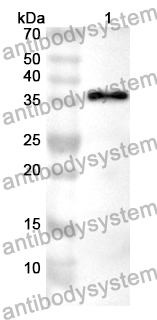Catalog No.
PHH25101
Species reactivity
Human
Host species
Rabbit
Isotype
IgG
Clonality
Polyclonal
Immunogen
E. coli - derived recombinant Human E2F4 (Ser16-Lys82).
Tested applications
ELISA: 1:4000-1:8000, IHC: 1:50-1:100, WB: 1:1000-1:4000
Target
E2F4, Transcription factor E2F4, E2F-4
Purification
Purified by antigen affinity column.
Accession
Q16254
Applications
ELISA, IHC, WB
Form
Liquid
Storage buffer
0.01M PBS, pH 7.4, 50% Glycerol, 0.05% Proclin 300.
Stability and Storage
Use a manual defrost freezer and avoid repeated freeze thaw cycles. Store at 2 to 8°C for frequent use. Store at -20 to -80°C for twelve months from the date of receipt.
Defects in efferent duct multiciliogenesis underlie male infertility in GEMC1-, MCIDAS- or CCNO-deficient mice., PMID:30936178
The Immunome of Colon Cancer: Functional In Silico Analysis of Antigenic Proteins Deduced from IgG Microarray Profiling., PMID:29505855
Molecular cloning, expression, and characterization of E2F transcription factor 4 from Antheraea pernyi., PMID:28436337
E2F8 as a Novel Therapeutic Target for Lung Cancer., PMID:26089541
PDT-induced epigenetic changes in the mouse cerebral cortex: a protein microarray study., PMID:24055374
Development of ultra-super sensitive immunohistochemistry and its application to the etiological study of adult T-cell leukemia/lymphoma., PMID:22685351
[The cell cycle regulator p130 and beta-catenin form a complex in mesenchymal stem cells]., PMID:21516817
Roles of the ERK, JNK/AP-1/cyclin D1-CDK4 pathway in silica-induced cell cycle changes in human embryo lung fibroblast cells., PMID:21314641
DLK1: increased expression in gliomas and associated with oncogenic activities., PMID:16288219
E2F-HDAC complexes negatively regulate the tumor suppressor gene ARHI in breast cancer., PMID:16158053
Regulation of transcription of the human MRP7 gene. Characteristics of the basal promoter and identification of tumor-derived transcripts encoding additional 5' end heterogeneity., PMID:15474296
Glycogen synthase kinase 3 phosphorylates RBL2/p130 during quiescence., PMID:15456871
Up-regulation of transcriptional factor E2F1 in papillary and anaplastic thyroid cancers., PMID:15118916
The nucleocytoplasmic shuttling of E2F4 is involved in the regulation of human intestinal epithelial cell proliferation and differentiation., PMID:15040009
Expression of E2F-4 gene in colorectal adenocarcinoma and corresponding covering mucosa: an immunohistochemistry, image analysis, and immunoblot study., PMID:12373148
Retinoblastoma-cyclin-dependent kinase pathway deregulation in vestibular schwannomas., PMID:12352662
An E2F-binding site mediates the activation of the proliferative isoform of 6-phosphofructo-2-kinase/fructose-2,6-bisphosphatase by phosphatidylinositol 3-kinase., PMID:12139485
Isolating human transcription factor targets by coupling chromatin immunoprecipitation and CpG island microarray analysis., PMID:11799066
The chromatin structure of the dual c-myc promoter P1/P2 is regulated by separate elements., PMID:11279041
Mechanisms of suberoylanilide hydroxamic acid inhibition of mammary cell growth., PMID:11250759
Expression patterns of retinoblastoma and E2F family proteins during corneal development., PMID:10752941
Modulation of E2F activity in primary mouse B cells following stimulation via surface IgM and CD40 receptors., PMID:10540350
E2F activity is regulated by cell cycle-dependent changes in subcellular localization., PMID:9372959
Induction of S-phase entry by E2F transcription factors depends on their nuclear localization., PMID:9271426
BRCA1 proteins are transported to the nucleus in the absence of serum and splice variants BRCA1a, BRCA1b are tyrosine phosphoproteins that associate with E2F, cyclins and cyclin dependent kinases., PMID:9244350
Accumulation of E2F-4.DP-1 DNA binding complexes correlates with induction of dhfr gene expression during the G1 to S phase transition., PMID:9020173
E2F-4 switches from p130 to p107 and pRB in response to cell cycle reentry., PMID:8657117
Deregulated expression of E2F family members induces S-phase entry and overcomes p16INK4A-mediated growth suppression., PMID:8622649
E2F-4, a new member of the E2F gene family, has oncogenic activity and associates with p107 in vivo., PMID:7958925

